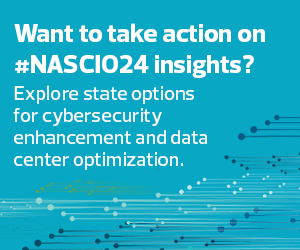Massachusetts Develops AI Use Cases and Pilot Programs
The commonwealth has prioritized a list of AI use cases for development consideration, Snyder said, and his agency has established an AI sandbox to allow safe and secure AI experimentation. “I truly believe that creating policy and protections against AI should be based on understanding AI,” he said. “The best way to understand AI is through usage.”
The commonwealth also stood up the Innovate MA pilot program, where institutions of higher learning in the state, such as Harvard, help develop potential use cases. Use cases in the pilot program include work with agencies such as MassHealth, the Massachusetts Department of Transportation, the Massachusetts Bay Transportation Authority and the commonwealth’s Executive Office of Energy and Environmental Affairs. Some of those use cases involve intelligent document processing and chatbot applications.
Massachusetts staffed an AI center of excellence with cross-functional teams to address technical architectures, responsible AI controls, standard operating procedures, security and privacy policies, and more. Through an executive order, the commonwealth set up the task force that will produce initial recommendations at the Massachusetts AI Summit. Snyder and the Massachusetts Secretary of Economic Development co-chair the task force.
The task force must “identify what we can do for the industries of Massachusetts to encourage the use of AI, to better understand AI and to build the training experiences necessary for AI talent,” Snyder said.
In the first half of 2024, the commonwealth also hosted popular brown bag sessions with state government employees to train them on getting started with AI.
READ MORE: State and local governments can improve citizen experience with AI solutions.
Washington State Seeks a Better Customer Experience for Residents
Addressing the same NASCIO panel, Washington state CIO Bill Kehoe acknowledged that his state is not as far along as Massachusetts but that he hopes to gain ground quickly. “I don’t have a lot of cool use cases yet, but we are building that foundation,” he said. “It’s our goal to be the Amazon Prime of government.”
Kehoe emphasized the importance of coordinating with local government in producing potential use cases and piloting AI. “As a state, we are trying to lean in and involve local government in these conversations,” he said.
Washington established an enterprise IT strategic plan that includes line-of-business owners as well as government IT officials. The strategic plan has four goals:
- Create a government experience that leaves no community behind.
- Use data and insights to improve the experiences of Washington residents and businesses.
- Prioritize solutions that address systemic societal challenges and align decision-making.
- Transform how government workforce does business with agile practices and processes.
“Getting the training to our business and IT staff is important,” Kehoe said.
Kehoe stressed that modernization projects should be customer-focused and start with the user experience back to the legacy systems that support it. “We are focusing on the customer first with user-centered design and talking to our customer,” he said. “As we learn more about what our customer needs are, you can imagine the power of AI to help us in that area.”
Ultimately, Washington state seeks to have a connected government that delivers a pleasing experience for its residents. Officials will engage in journey mapping to gain insights.
“In our state, every agency has their own experience and their own way of engaging with the customer that forces our residents to go to multiple places for critical services,” Kehoe said. “This is a big deal for us. Right now, that experience is not good. It can be frustrating when people are not getting the service that they need.”
Part of that effort will include building a uniform identity and access management program, which Kehoe called a “resident portal” or “front door.” “The opportunity for AI to be part of that is huge,” he said.
Washington Technology Solutions is currently accepting bids on a procurement opportunity to create a roadmap in support of the resident portal. That roadmap should eventually grow into an active project, Kehoe said.
Keep this page bookmarked for our coverage of the NASCIO 2024 Midyear conference. Follow us on X, formerly known as Twitter, at @StateTech and the official conference Twitter account, @NASCIO. Join the conversation using the hashtag #NASCIO24.











